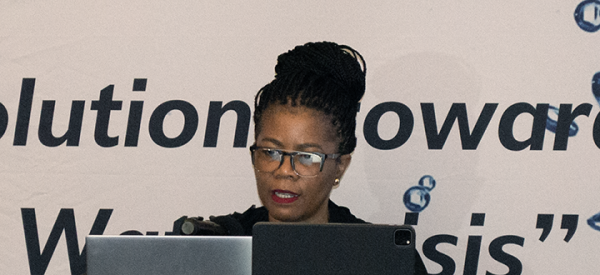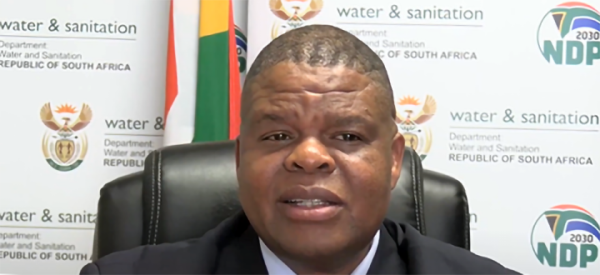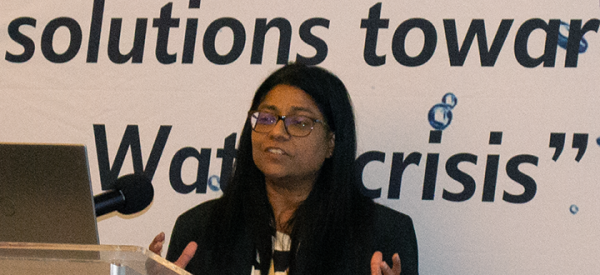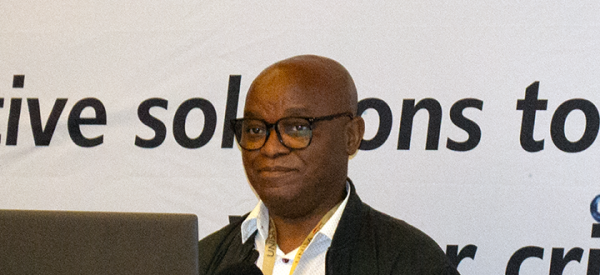
As part of the country’s National Water Week celebrations, Unisa, together with the Water Research Commission (WRC) and the Department of Water and Sanitation (DWS), hosted the 2025 Water Imbizo on Tuesday 25 March 2025, under the theme Forging collective solutions towards the South African water crisis.
In her welcome address, Unisa Principal and Vice-Chancellor (VC), Prof Puleng LenkaBula, addressed a series of concerns around intergenerational water preservation, fair distribution of water and pollution in dams, asking: "What to do we do about these concerns, and how do we influence the policy systems that govern and protect our water sources?".

Prof Puleng LenkaBula, Unisa Principal and Vice-Chancellor
In the same vein, the VC questioned what is being done about the infrastructure development systems created for the allocation, management and conservation of water. She continued: "It appears that in areas such as the Vaal and other regions, we have not learned how to save water for future use. We need you, as scientists, to give us solutions to ensure that the quality of water is enabling for the sustainability of communities and industry, and ensures ecological and environmental sustainability."
Concluding, the VC said that regarding infrastructure development, there should be technology-integrated water management systems that enable equal distribution mechanisms between townships, and rural and urban areas to reflect the gains of the country’s democracy.
Through a pre-recorded video message, keynote speaker, the Honourable David Mahlobo, Deputy Minister of Water and Sanitation, stated that water and sanitation issues remain emotive problems requiring serious attention because they impact a number of imperatives, including lives, dignity and security as a basic need. "In addition," Mahlobo said, "urban migration placed major duress on the ailing water infrastructure, with increased demand heightening the water crisis."

Keynote speaker, the Honourable David Mahlobo, Deputy Minister of Water and Sanitation
Continuing, Mahlobo said that South Africa remains a semi-arid country, but noted that rainfall varies from one part of the country to another, albeit with alarming negative effects in some areas, such as the recent water crisis and low dam levels in the Mandela Bay District Municipality, adding: "Our annual rainfall averages 450 mm, which is far less than the global average of 860 mm."
To alleviate this, Mahlobo said that government must ensure that they partner with key stakeholders, policy makers and higher education institutions to harness the country’s total mean annual runoff average of 49 000 million cubic metres.
Arguing for equitable allocation, Mahlobo noted that there is a skewed distribution of water, stating that agriculture uses 60%, 27% goes to domestic use, 3% to industries, and 3% to nature conservation and afforestation, while other percentages remain varied, adding: "We need to work with these sectors to address the allocations and adjust them using science, technology, and data applications to ensure a fair allocation while ensuring sustainable production."
Mahlobo said that over the past 30 years, South Africa has done well in terms of water services, with improved access to households previously denied access to water based on apartheid laws, and that there are further improvement plans in the cards.
On a positive note, Mahlobo assured the audience that the country is not going to run out of water, expressing confidence in the sustainability measures emanating from this imbizo in which key partners and stakeholders are participating.
Concluding, Mahlobo said that the DWS is currently partnering with municipalities to encourage strong revenue collection channels, address the issue of water tankers, and promote water preservation through legal frameworks, while encouraging responsible water usage within communities and industries.
Dr Valerie Naidoo, Senior Manager for Water Advisory Services at the WRC, gave a brief outline of the services offered by the organisation. Naidoo said the WRC is a dedicated key player established by legislation towards generating new knowledge on water research and preservation, and stressed the significance of building partnerships with stakeholders present at the imbizo to tackle the water issues the country is facing. She stated that, among others, the WRC specialises in

Dr Valerie Naidoo, Senior Manager for Water Advisory Services - WRCSA
Concluding, Naidoo outlined the South African Water and Sanitation roadmap for the 3rd and 4th industrial revolution for smart municipalities/utilities, which, she said, is a research-driven roadmap themed One water, one health, the circular economy, which details the use of smart water security, digital operations, automation and smart agriculture, among others, to resourcefully maximise water usage – this, she said, cannot be fully accomplished unless they work together as researchers to fulfil the objectives of this roadmap.
Sandile Ngcobo from the South African Local Government Association drew from correlating research, stating that before the introduction of measures that increase life expectancy such as the use of antiretroviral drugs, among others, life expectancy was below 55 years, but after their introduction, he said, people could live up to more than 65. "This," he said, "misaligned with infrastructure development, economic growth, and policies meant to work in tandem with population growth and life expectancy." He continued: "Our water and waste water treatment plants were to some degree unable to keep up with demand."

Sandile Ncgobo, South African Local Government Association
Furthermore, Ngcobo said a study carried out by top environmental chemist, Prof Vhahangwele Masindi, on catchments of the Magalies Water entity – among the largest operating in North West, Limpopo and Gauteng – revealed the following unregulated emerging contaminants:
Continuing, Ngcobo said that Magalies Water has partnered and is continuing its partnerships with several institutions of higher learning, including Unisa, to conduct research on curbing this matter.
Concluding, Ngcobo said that Magalies Water has given bursaries for the years 2024/25 to various institutions of higher learning across the country, with Unisa’s students contributing the highest number of beneficiaries intending to distinguish themselves as water resource managers/specialists and environmental scientists aiming to end the country’s water crisis using the latest innovative technologies powered by 4IR.
Various academics, researchers and other key stakeholders, including Unisa’s Prof Anja du Plessis, water management expert, and James Topkin, Research Manager: Ekurhuleni Water Care Company, continued to deliberate on measures to alleviate the country’s water crises.
The 2025 Water Indaba underscored the significance of partnerships and hands-on approaches with academics and researchers who will be able to put together actual solutions intended for direct engagement with water crises.
* By Godfrey Madibane, Acting Journalist, Department of Institutional Advancement
Publish date: 2025-03-26 00:00:00.0